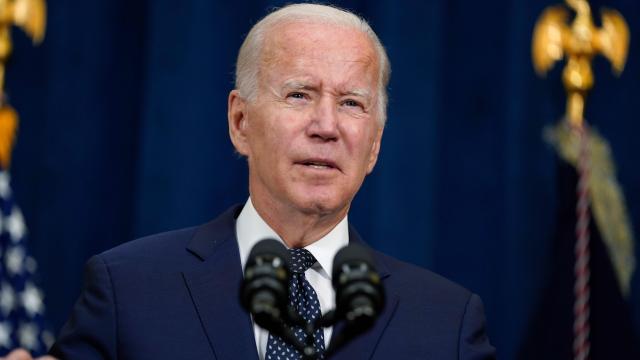Reports early Tuesday suggested that the Biden administration was considering issuing an executive order declaring a national climate emergency as soon as Wednesday. The possible emergency order was first reported on by the Washington Post, which cited three unnamed sources “familiar with the matter.” A separate report from The Hill made similar claims based on two anonymous sources.
The reports suggested that an announcement on the declaration could come during Biden’s scheduled to visit a shuttered coal plant in Somerset, Massachusetts tomorrow. There, the President will “deliver remarks on tackling the climate crisis and seizing the opportunity of a clean energy future to create jobs and lower costs for families,” according to a tweet from White House Press Secretary Abdullah Hasan. However, a source told the Associated Press that Biden wouldn’t be declaring an emergency on Wednesday and would instead be announcing other, less forceful climate policy.
Whatever happens tomorrow, there’s renewed pressure on Biden to issue an emergency executive order on climate.
Why are people calling for a climate emergency declaration?
A U.S. climate emergency declaration isn’t a new idea. Progressive lawmakers have previously tried to pass legislation requiring Biden make the move. It’s also been a consistent demand from environmental activists nationally and abroad. Earlier this year, more than 1,100 organisations signed an open letter asking Biden to issue an emergency climate order.
For context: Presidential emergency declarations are common. Since the National Emergencies Act was passed in 1976, every president has issued at least one. Trump, for instance, used emergency declarations to get funding for his border wall and to respond to the covid-19 pandemic. Biden has also used emergency orders for the ongoing pandemic response.
This renewed talk of a climate emergency order follows a week of dashed hopes for climate action. Last Wednesday, West Virginia Senator (and coal benefactor) Joe Manchin once again stalled on his promised support for climate legislation. He said that he wouldn’t approve increases in federal spending for clean energy or methane emission penalties until inflation slows, going back on his assurances from just the week before to approve the remaining scraps of the “Build Back Better” plan. In response, Biden vowed “strong executive action.”
This is not the first time Manchin has held the rest of the Senate Democrats hostage over climate policy — promising to lend his approval if his requests are met and then backing out anyway. The man is a professional, political gaslighter. But as the saying goes: Fool the Democratic Party once, shame on you. Fool the Dems twice, shame on them. (Fool them a third time, and maybe there’s something inherently wrong with our political system, or the majority party is not actually trying that hard to enact the legislation it says it supports…)
Regardless, significant action can’t wait for the Senate to figure itself out, and Biden seemed to agree last week. We are already running down the clock on climate, and every delay guarantees a worse future. Joe Manchin is probably not going to change. He has no reason to. In fact, he has every reason to keep stalling climate policy and supporting fossil fuel extraction, because each time he does, he gets a little bit richer. Instead of pinning our collective hopes for national political action on one deeply corrupt senator, we need a new climate policy approach.
An executive order declaring a climate emergency could be a first step in the right direction. The administration might use the emergency power to halt offshore drilling, stop crude oil exports, and fund the green energy transition. Or it could opt to just issue an order and follow it with little else — leaving the emergency declaration a hollow statement. The outcome would directly depend, for once, not on the whims of Manchin, but on Biden’s political will to actually exercise his extensive power.
What could Biden do?
Climate change is a global emergency. That is, at least according to scientists, the most up-to-date comprehensive research report on climate change and its impacts, and multiple national governments including Canada, South Korea, Spain, and the United Kingdom.
If Biden agrees, and opts to issue an executive order declaring a climate emergency, he could harness “emergency executive powers already granted by Congress to aggressively combat the crisis,” according to a February report from the nonprofit conservation organisation the Centre for Biological Diversity.
Those powers specifically include ones granted under the National Emergencies Act, the Defence Protection Act, and the Disaster Relief and Emergency Assistance Act. Using these laws, the report explains that Biden could both stymie fossil fuel production and bolster sustainable sector growth.
Biden could stop exports of crude oil by reinstating a set of restrictions overturned in 2015, halt all offshore oil and gas drilling in federal waters, and place new restrictions on fossil fuel trade and investment. Simultaneously, he could boost funding for clean energy and transportation development as well as climate resilience measures. “The issue is not whether President Biden can make substantial progress on climate; the question is will he do so,” concludes the Centre for Biological Diversity report.
An executive order and emergency declaration would be far from enough to solve our climate woes, and many of the actions restricting drilling or investment would be likely to face immediate and intense legal challenges from the fossil fuel industry. But regardless, each of these suggested actions would be a significant ramp up from what the Biden administration is currently doing.
The President has regularly referred to climate change as an “emergency.” If he really believes that to be the case, he could back up the word with policy, and turn that policy into a meaningful response.
